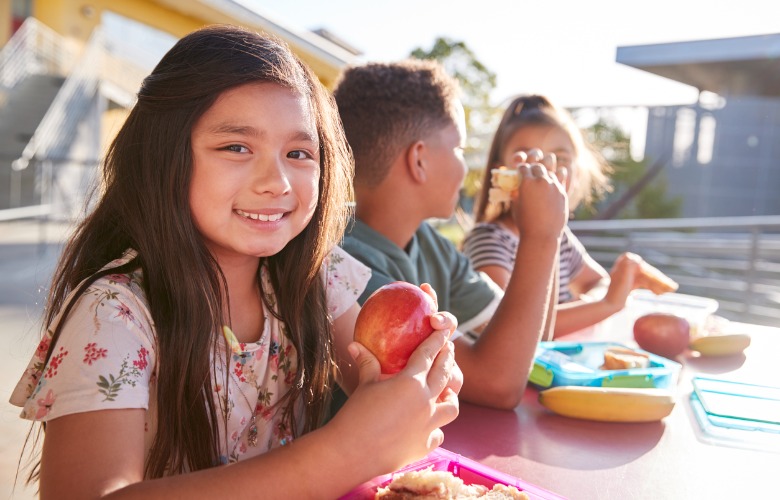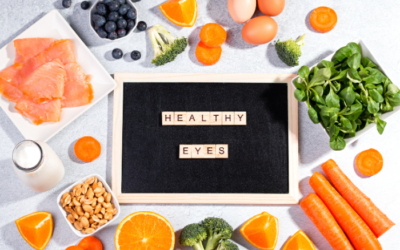Back to School Health – All Day Long

Healthier Mornings
Mornings can be hectic during the school year. Who has what planned for the day, work commutes, school buses to be on time for, and breakfast to be eaten! There are a few ways to make this time healthier and more efficient for everyone.
Double-check your family calendar
Look to see if there is a school trip, extra-curricular, or test that might have slipped your radar. That way, you can remain calmer and more mindful about what has to happen that day—keeping your stress in check. Need an extra boost? Adaptogens can help manage stress, support your adrenal gland function (where your stress hormone, cortisol, is produced), and help your child feel more prepared for the day. Ditto for making sure clothes are ready to go, the backpack is by the door, and looking up the weather – anything to make the morning stress-free as possible.
Eat a healthy breakfast
Try to have food prepped beforehand, so you aren’t tempted to grab a less healthy option during the chaos of the school morning. Some great options for quick, healthy breakfast options include:
- Hard-boiled eggs
- Overnight Oats
- Avocado toast
- Egg muffins
- Smoothies
- Healthy muffins
- Yogurt parfaits
- Breakfast tacos
- French toast sticks
Good hygiene habits
Some of the things you do in the morning for hygiene include brushing teeth, washing your face, and fixing your hair. In addition to hygiene, these things help wake you up, boost your mood, and make you feel ready for the day. Establishing healthy habits in your kids can help them carry these routines throughout life –good oral health or self-care rituals.
Hydrate and keep it going
According to the American Academy of Pediatrics (AAP), children should drink six to eight glasses of water each day, keeping their age, weight, and gender in mind. Getting a headstart in the morning is a good idea to meet those recommendations. This is especially true when your child has gym, research, or sports after school.
Water is an excellent choice because:
- It has zero calories
- Contains no added sugars
- It helps support joint function, blood circulation, and oral health
- It enables the brain to stay hydrated and boosts focus and concentration.
Does your kid hate water?
- Try infusing it with fruits like berries, cucumbers, or lemon.
- Give your kid water in a water bottle they pick out and love.
- Give it to them with ice – some kids prefer ice-cold water.
- Add it to smoothies.
- Give them fruits and vegetables with high water content, including celery, watermelon, blueberries, grapefruit, strawberries, lettuce, zucchini, and cucumbers.
- Limit sugary drinks, juices, and flavored milk.

School Day Health
Boost the immune system
Especially post-pandemic, immune function is on everyone’s radar these days. A few ways to keep the whole family immune function supported include:
- Include more fruits and vegetables in meals and snacks – especially phytonutrient-rich ones like green beans, oranges, carrots, and strawberries.
- Everyone takes a daily multivitamin. Not sure which one – look for one created for individuals to make sure everyone is getting the nutrition they need at whatever stage in their life. Multivitamins come in formulas for infants, toddlers, children, teens, women, men, and seniors.
- Give them herbs that support their immune system, like elderberry and echinacea.
- Get active – exercise boosts your immune system, and doing it as a family is a great way to bond.
- Wash hands often – this is more important than ever now – even better if it is outdoors in the fresh air!
- Don’t allow smoking in your home – second-hand smoke contains more than 7,000 harmful chemicals and increases a child’s risk of asthma, ear infections, and bronchitis.
Get their brain ready for learning
Your child’s brain health is essential for the healthy growth of the mind and body. While supplements can help if they lack nutrients, the natural approach always includes a good night’s sleep, lots of exercise, foods that feed their brains such as omega-3, limit sugar, processed foods, and limit the use of electronic devices – especially right before bed.
Omega-3 is an essential fatty acid that plays a role in vision, heart health, mood, and brain function. It is primarily found in fish, although it can be found in plant-based sources, including flax and chia seeds. Many teens do not get enough omega-3 in their diets, and because their bodies are in a constant state of change once they kit puberty – it is sometimes a good idea to supplement during this transition.
Parents – Relax!
Take the time away from your kids to relax, breathe and regroup. Take mini-breaks throughout your day while working or on your daily routine:
- Schedule time to meditate each day. Even as little as 10 minutes can be beneficial.
- Exercise regularly, try practicing mindfulness by focusing attention on your body as you move.
- Deep breathing can be done almost anywhere and is a quick method of reducing stress.

Lunchtime Habits
Eat the rainbow
It is recommended that you try to eat as many phytonutrients as possible in a wide range of colors in whole foods that include the rainbow of plant-based fruits and vegetables:
- Red foods include tomatoes, red peppers, raspberries, apples, cherries, strawberries, and watermelon. Red foods contain lycopene, ellagic acid, quercetin, hesperidin, fiber, and vitamins A and C.
- Orange and yellow fruits and vegetables contain nutrients like zeaxanthin, flavonoids, lycopene, potassium, vitamin C, and beta-carotene. Carrots, mangos, oranges, bananas, peaches, pineapple, papaya, starfruit, lemons, and apricots are just some of the orange and yellow foods out there.
- Green foods support heart health, are filled with antioxidants, and are rich in vitamin K, magnesium, nitrates, and folates. Broccoli, Brussels sprouts, cabbage, kale, microgreens, collard greens, spinach, kiwis, and avocado are just a few of the nutrient-dense green foods to choose from.
- Blue and purple foods include blueberries, eggplant, blackberries, elderberries, beets, black rice, grapes, purple cabbage, plums, and purple sweet potatoes. These foods contain anthocyanins that have been found to reduce inflammation, fight cancer, improve mental function, and inhibit UV rays the aging effects of UV rays on the skin.

Afterschool Focus
Homework, extra-curricular activities, and downtime are all part of your child’s day once the school day ends. Afterschool can be a hard time to focus when they had to all day during the school day. A great way to boost focus and concentration is to offer holistic herbs to help your children stay calm and engaged in the afternoon.
If your child lacks focus and concentration, is restless or fidgeting often, or just stressed – a holistic approach is to soothe or calm the brain and the nervous system. Some of the herbs and supplements that can help to calm children down as well as help them focus include:
- Chamomile – relaxes the nerves and helps support sleep. Chamomile can also be used for diarrhea, upset tummy, acid reflux, and indigestion.
- Lemon balm – Support for over-excitement and nervousness.
- Magnesium – can help with sensory issues, hyperactivity reduces irritability, helps with growing pains, and reduces anxiety.
- When they are grumpy, overtired, and overstimulated, try passionflower, skullcap, and tulsi.

School Nights
Eat together as a family
When back to school comes, we tend to switch from lighter summer eating to heavier foods. While these are great in moderation, try to remember the summer salads you enjoyed. Ditto for the popsicles – summer is made for ice -cream. Try replacing it with frozen yogurt or an apple instead. Fall is an excellent time to incorporate harvest foods like apples, pears, pumpkin, beets, Brussels sprouts, cranberries, and sweet potatoes into your family dinners. Lastly, try to sit down together for a meal at least 3-5 times per week to talk about your day.
Studies show that kids benefit from eating as a family:
- Kids learn more rare words during dinnertime conversation – 1,000 words on average.
- Teens are twice as likely to get A’s when eating dinner with their family at least five times per week.
- More likely to eat more vegetables and fruit.
- Less likely to be obese.
- More likely to eat healthier as adults.
- Studies also show that the kids who have regular family dinners are less likely to smoke, binge drink, use drugs, or experience problems at school.
- Lower rates of depression and suicidal thoughts.
Bedtime routines
- Toddlers require 11 to 14 hours of sleep per day and preschoolers need 10 to 13 hours – these include naps. Older children should get at least 8 to 10 hours of sleep per night.
- Establish a routine that involves everything that needs to be done in an order your child can learn – this can include teeth brushing, putting on pajamas, bedtime stories, tucking them in, picking a stuffed animal to cuddle, and talking about the day they had.
- While you may want to dive right into a new schedule, switching from summer to back to school is a huge transition. Depending on how you spent the summer, try to ease into a new schedule. Slowly change bedtimes by 10 minutes at night and 10 minutes earlier in the morning.
- Many parents give their children melatonin to regulate their sleep-wake cycle and balance their circadian rhythms. Melatonin is the hormone produced in the brain by the pineal gland and happens naturally. Some fish, eggs, nuts, seeds, and bananas contain melatonin and are good before bedtime snacks.

Jemile earned a degree in Food Studies and Writing and has worked for almost 23 years in the medical and health industries. She has been a digital marketing consultant for Acupuncture Atlanta since 2011 as the social media manager and content manager. Writing has been a childhood dream for Jemile and writing daily for clients in the health, wellness, food, and art industries have been phenomenal. Jemile is originally from Brooklyn, NY, and lives in the Hudson Valley, NY. She lives with her husband, two daughters, her dog, and two fish. You can contact Jemile via Linkedin, her mom blog, or her website, lunaroseconsulting.com



